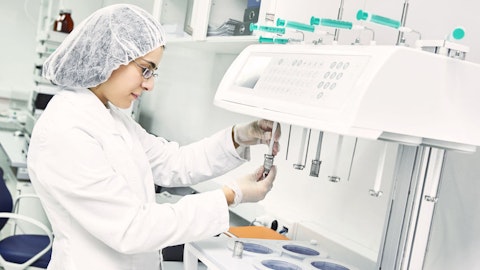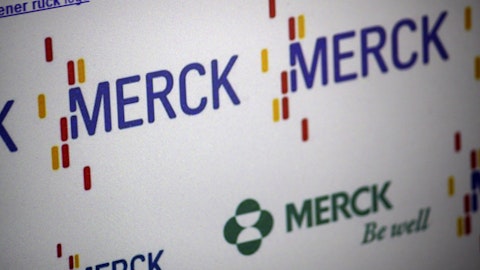By Khojinur Usmonov
From low costs to expedited drug approval, President Trump recently met with big pharma CEOs about overhauling the entire system. Here’s what you need to know.
A few weeks ago, President Donald Trump met with a series of biotech CEOs to discuss a historically major pain point for the industry: cutting the FDA drug approval process “at a level no one has ever seen before.”
Word leaked in December (before Trump officially took seat in the White House) that the then-President-elect could be looking into overhauling the FDA drug approval process, a process that’s been a big thorn in the side of many medical companies and biotech companies.

g0d4ather/Shutterstock.com
After approving an all-time high 51 new drugs in 2015, FDA-approved drugs dropped to just 22 in 2016, the lowest since 2010. And January has been slow, with just two drugs clearing the FDA hurdle, according to Nasdaq.
“We’re also going to be streamlining the process,” Trump told CEOs from Pharmaceutical Research and Manufacturers of America (PhRMA), Merck & Co., Inc. (NYSE:MRK), Novartis AG (ADR) (NYSE:NVS), Johnson & Johnson (NYSE:JNJ), Celgene Corporation (NASDAQ:CELG) and others in the highly publicized meeting, “So that from your standpoint, when you have a drug you can actually get it approved, instead of waiting for many, many years.”
In early January, a number of biotech stocks took a hit, with Trump blaming the volatility on a “disastrous” industry. “The other thing we have to do is create new bidding procedures for the drug industry, because they’re getting away with murder,” the President said (1).
In addition to a lengthy and costly approval process that can take up to 20 years, the U.S. typically pays more for drugs than any other developed countries. Most Western European countries, as well as Japan, have government-run health care coverage.
“We’re the largest buyer of drugs in the world, and yet we don’t bid properly,” Trump said. “We’re going to start bidding. We’re going to save billions of dollars over a period of time.”
Due to high costs imposed by the regulatory system, the estimated average costs of one new medicine ranges from $1 billion to $4 billion, Forbes reported. In the meeting with big pharma CEOs – who actually benefit from the status quo, Trump pressed them to come down on their pricing, while also keeping manufacturing in the US.
“You folks have done a very great job over the years,” Trump told the executives, “but we have to get the prices down.”
Meeting attendees included pharma CEOs like Merck & Co., Inc. (NYSE:MRK)’s Ken Frazier ($179 billion market cap), Novartis AG (ADR) (NYSE:NVS)’s Joe Jimenez ($194.617 billion), Johnson & Johnson (NYSE:JNJ)’s Alex Gorsky ($308.5 billion), Amgen, Inc. (NASDAQ:AMGN)’s Robert Bradway ($124 billion), Celgene Corporation (NASDAQ:CELG)’s Mark Alles ($90 billion), and Stephen Ubl, head of industry’s trade association, PhRMA.
Trump says he plans on appointing a new FDA chief, with managing director of Peter Thiel’s Mithril Capital Jim O’Neill the rumored favorite to take the top spot.
According to a December Forbes report, O’Neill has publicly supported proposals to do away with the FDA’s requirement for phase 2 and 3 trials, instead favoring a more “progressive approval” of drugs and other medical technologies.
While the thorough approval process has been put in place to ensure safety of the drugs, the damages incurred are massive, with billions in costs plus potential of lives lost due to effective, but unapproved, drugs not passing phase 2.
“Another side effect of the current system is that many drugs never leave the lab,” Forbes’ Patrick Cox reported. “These are drugs that could effectively treat serious illness but aren’t worth the cost of approval. This is because the patient population is too small to recoup approval costs.”
“We’re going to get the approval process much faster,” said Trump. “One thing that’s always disturbed me is that you come up with a new drug for a patient that’s terminal and FDA says you can’t have this drug used on this patient and patient will be dead… we don’t know if drug works or doesn’t work, but the patient’s not going to live for more than four weeks.”
While the human costs are one thing, for many small-cap stocks, phase 2 approval is the make-or-break stage, the one key event that ensures the drug hits the market and the business gets to run.
Follow Merck & Co. Inc. (NYSE:MRK)
Follow Merck & Co. Inc. (NYSE:MRK)
Receive real-time insider trading and news alerts
For small cap biotech companies, an FDA approval can make or break a stock.
As 2016 came to a close, two biotech stocks in particular – Vericel Corp (NASDAQ:VCEL), a small cap stock with an $88 million market cap, and Synergy Pharmaceuticals Inc (NASDAQ:SGYP) ($1.14 billion market cap) – were being monitored closely by investors as a January FDA approval inched close.
Sure enough, when Vericel announced FDA approval on December 14, the stock surged by 57.69% to a $134 million valuation, adding close to $50 million in market value overnight – huge for a stock its size. (Synergy also earned January approval for its constipation drug Trulance).
Follow Synergy Pharmaceuticals Inc. (NASDAQ:SGYP)
Follow Synergy Pharmaceuticals Inc. (NASDAQ:SGYP)
Receive real-time insider trading and news alerts
Steven Christmann, managing principal of Christmann & Gutermann, a $6 billion investment fund, says the FDA phase 2 is one major deterrent in going for biotech stocks — even if the drug has a widespread need in the market place.
“It’s very speculative and even if the drug is groundbreaking, in my eyes at least, the FDA issue makes it problematic from an investment standpoint,” Christmann says. “By streamlining this process, as President Trump put it, would make fund managers look closer at some tech stocks out there, particularly in the small-to-mid range.”
Outside of the big pharmaceuticals who can afford it, a big issue behind the FDA approval process is the staggering costs to even get it to the shelves, estimated at close to $3 billion, Motley Fool reported (2) last year.
Another obstacle comes in the form of lesser-known conditions that plague millions, but for one, have no approved therapy and two, rarely make the headlines, let alone pass the FDA approval.
“The way it is now, it makes it extremely hard for small biotechs, such as Hemispherx, to take the risk to bring a medication to market,” CEO of biotech company Hemispherx BioPharma, Inc (NYSEMKT:HEB) Tom Equels says. “Especially for a drug like Ampligen that specializes in meeting certain critical unmet medical needs for a large and disabled patient population.”
Hemispherx’s drug Ampligen treats the little-known chronic fatigue syndrome disease (ME/CFS), an ailment that – according to CDC estimates – affects roughly one million people in the US, many of whom are completely disabled.
In addition to leaving patients untreated, Equels says the total cost to society of not approving a drug runs up to at least $18 billion, according to the CDC. And that’s from chronic fatigue syndrome alone.
“Whether it’s a cancer patient with only six months left to live, or a severe ME/CFS patient, who’s bed-ridden and completely disabled in a dark room, these are U.S. citizens who have desperate unmet medical needs,” Equels says. “We have to have the compassion and the flexibility to adjust our process so those needs can be met safely, but quickly.”
Should Trump’s plan come to fruition, Equels estimates a sped-up drug approval process could create thousands of new high paying U.S.-based jobs in production, manufacturing and distribution. And it looks like new biotech jobs could be in the pipeline: For what it’s worth, PhRMA echoed those points in its own post-meeting statement, adding that the policies, if enacted, would result in up to 350,000 new jobs over the next 10 years.
“Tax, deregulation – those are things that could really help us expand operations,” Eli Lilly and Co (NYSE:LLY)’s CEO Dave Ricks said, according to Reuters.
Follow Aim Immunotech Inc. (AMEX:AIM)
Follow Aim Immunotech Inc. (AMEX:AIM)
Receive real-time insider trading and news alerts
And according to a transcript, Amgen CEO Bradway said he promised to add 1,600 U.S. jobs this year, which a spokesperson later confirmed: “We look forward to working collaboratively with the new administration.”
Macro and medicine aside, the upside could be huge to stock investors also. Many investors look at biotech stocks, banking purely on the innovation or the pending FDA approval (like the aforementioned Vericel example). In fact, a remarkable number of billion-dollar biotech companies have $0 in revenue, yet post market caps in the billions.
In 2013, we listed 13 of these exact stocks with billion-dollar valuations (3) that had $0 in earnings, with market value coming strictly from the speculative demand of the drug. Yet, nearly four years later, a number of these companies have failed to clear FDA approval.
Follow Eli Lilly & Co (NYSE:LLY)
Follow Eli Lilly & Co (NYSE:LLY)
Receive real-time insider trading and news alerts
As an example, Acadia secured a billion-dollar valuation back in 2013, with an FDA approval still pending and expected in 2015. They didn’t receive one till 2016. And after sitting on a $1.2 billion market cap in 2013, Amarin Corporation plc (ADR) (NASDAQ:AMRN) plummeted to just $300 million.
The company has even had to sue the FDA for rights to market its drug. (It circumvented FDA approval by citing free speech, the New York Times reported in May. The stock has since settled at $863.85M as of February 6.)
Right now, many U.S.-originated biotech advances gain approval in other countries — while having little or no access in US markets. To keep business robust, Equels says he’s sought approvals with foreign governments, including Argentina – a move designed to get a foothold in the 422 million population South American market.
“There’s a strong demand worldwide that this unmet medical need be met and we’re trying our best to do that,” Equels says. “But right now in the U.S., it’s a process that can take 12 to 20 years, and that makes it harder for [the US biotech companies] to compete globally without going into markets that have a more expedited process.
“If we want to be a leader in the biotech industry worldwide, we’ve got to make it possible for American companies to progress and thrive in the United States,” Equels adds. “Rethinking the approval process is key to making that happen.”
Follow Celgene Corp (NASDAQ:CELG)
Follow Celgene Corp (NASDAQ:CELG)
Receive real-time insider trading and news alerts
Disclosure: The views expressed here do not represent those of InsiderMonkey. Khojinur Usmonov is an external contributor to Small Cap Nation.
Additional Links:
(1) http://fortune.com/2017/01/11/trump-drug-prices-biotech-stocks/





